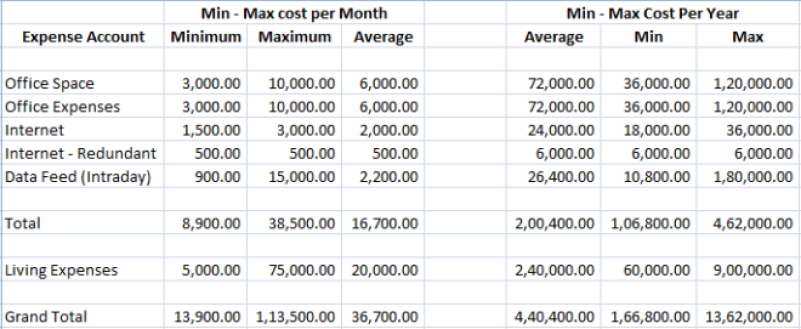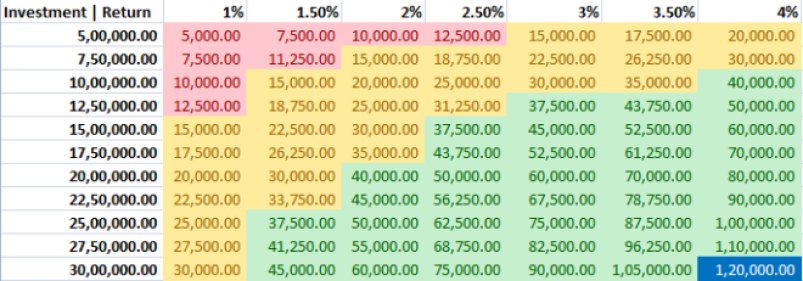Capital Requirement for a trader
When one starts any business, one has a pretty clear idea as to what would be the cost of starting the business. This may go from a few thousands (if you are starting a web based company) to a few crores (say to get a start in the construction business). But when it comes to trading, there is not much of clarity on what capital is required. This post is a attempt to calculate what you will need if you want to get into the business of trading for a living.
The biggest negative of trading for a living is the fact that the number of failures are humongous in number. I have been in the Industry for nearly 17 years now and I do not know of a single trader who was active when I started off and is still active as a trader now. Of course, there will always be folks who have been active for even more a period of time, but the numbers will be pretty small in nature.
One of the key reason why many a trader cannot sustain this venture is due to lack of a viable strategy. It does not matter how big a capital you start with, if you are chasing the wrong end of the stick, you will end up suffering total capital loss.
A second reason for many a trader to be unable to sustain this business is due to them starting with insufficient capital and then hoping to make a living of it. Markets are not a cow that will provide milk every day or a tenant who shall provide the landlord with a monthly income. Even the best of traders go without having a income (or even worse, having a loss) for months together.
Stress for the trader is guaranteed regardless of the methodology he follows if he has a payment to make and markets are not providing him with the moolah. Many a advise I have heard is to keep 3 years of expenses in a separate account so that you are not troubled by the lack of ability to buy milk the next day because you are having a streak of loses and cannot afford to withdraw capital at this juncture.
I constantly keep meeting traders and the one thing that is constant among many is that they are very well capitalized. This with a decent strategy assures that one will be able to survive the thrills and spills that accompany a traders life.
So, what would be the ideal capital for a trader?
The answer actually is dependent on a lot of factors including the style of trading. For example, capital requirements of a intra-day trader is very small compared to a positional non leveraged trader.
I did a small exercise as to what is the optimal capital requirement for a trader and the results are as shown in the pic underneath.
The above expenses sheet are based on my assumptions on what would be the cost that one needs to account for.
While the costliest data feed would be having a Bloomberg Terminal, I have assumed that not many a trader would actually go for that and instead based it on eSignal. I personally use Global Data Feeds and the amount I pay comes closer to the Average.
So, considering the above expenses, what is the capital requirement if one assumes that the system will over time generate X% / year (not consistently, but on a long enough time frame).
Most simple strategies do not beat the markets and this means that while its nice to be optimistic and think of generating 4 – 5% per month (48 – 60% per annum), in reality you shall find the returns somewhere between 1 – 2% per month (12 – 24%).
Assuming that you are a Average spender, that would mean that you would need a minimum capital of 2 Million to start with. And since we cannot be pulling out money month on month, you would need to store away half a million so that you do not have to worry about your expenses for a year at least. Totaling that up, you will need around 2.5 Million Rupees for one to get started.
The biggest disadvantage for a trader who needs to dip into the capital for expenses (removal even every year) is that he literally misses out on the Eight wonder of the World – Compounding.
Without compounding of capital, there is really very little of wealth generated over time and while you may feel confident that you can continue to do this till the end of your life, it does put a pressure on one to be correct as far as possible.
The biggest advantage of a trader is the ability to lead a life without having to stick to one place. You can travel around the world and yet continue to make a living. In fact, a guy whose website I recently stumbled upon seems to do the same thing and has claimed to have traveled more than 80 countries even as he day trades for a living. (Link)
At the same time, I have first hand witnessed financial destruction and even death of traders who were not able to sustain themselves. As I wrote in my previous post, the probability of survival for a trader (if this is his only source of Income) is pretty low. Just like not everyone can make it to the IIT, so is the ability to earn a living just through trading.
But if you can succeed, there is nothing more satisfying out there. No clients to argue with, no payments overdue, no employees to worry about. Hell, one is truly one’s own boss and driver of his destiny 🙂




Wonderful and clear article. A must read for all the one who want to choose trading as their bread and butter.
by the way heard from one of the Bloomberg Employee that JP morgan in Bangalore alone has 200 Terminals ( Probably average terminal cost for them could be anywhere between 1600-1800USD per month). 🙂
Thanks Rajendran.
Know a few friends who have Bloomberg, but all of them work for Corporate Companies. In US, a lot of Individual Traders too subscribe to Bloomberg, maybe we are seeing similar thing happening out here too.